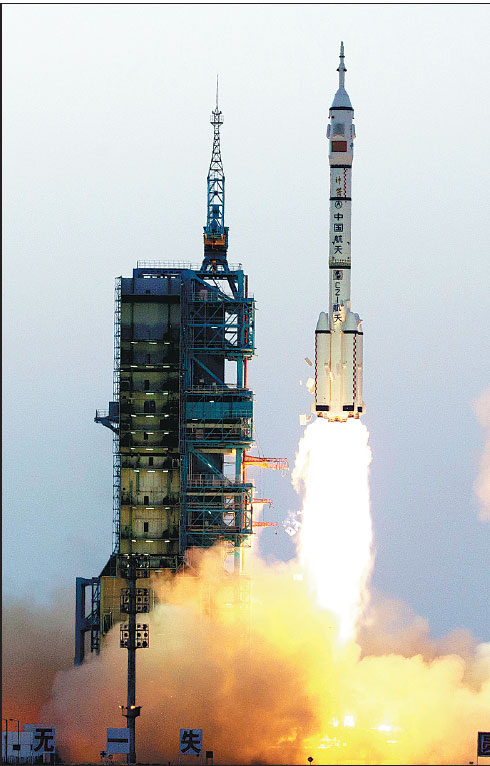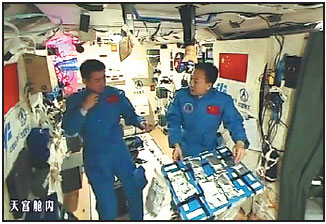The Most Accurate Clock In The Universe
Updated: 2016-11-07 08:04
By Yang Chunxue and Yu Fei(China Daily)
|
||||||||
|
Shenzhou XI, China's sixth manned spacecraft, is sent skyward atop a Long March 2F rocket from the Jiuquan Satellite Launch Center in the northwestern province of Gansu on Oct 17.Feng Yongbin/china Daily |
A Chinese-made timepiece designed to be precise forever is currently floating above the Earth aboard the Tiangong II space lab. Yang Chunxue and Yu Fei report for China Features at Xinhua News Agency.
While stargazers are focused on the two Chinese astronauts aboard the space lab Tiangong II, scientist Liu Liang is watching the time.
More specifically, he is watching the time on a "cold-atom" clock that he and his team have spent 10 years perfecting.
The cylindrical black object bears no resemblance to an ordinary clock, but it's one of the most advanced timepieces ever made. It will remain in standby mode for the duration of the astronauts' visit.
|
The "cold-atom" clock was developed by the Key Laboratory of Quantum Optics at the Shanghai Institute of Optics and Fine Mechanics with the Chinese Academy of Sciences.Liu Liang / For China Daily |
"It is probably hidden behind some curtains in the space lab," said Liu, professor and director of the Key Laboratory of Quantum Optics at the Shanghai Institute of Optics and Fine Mechanics with the Chinese Academy of Sciences.
The clock blasted off with Tiangong II in September, becoming the first cold-atom timepiece in space. "It is so accurate that it should not lose one second in 30 to 300 million years in space," Liu said.
For the past 10 years, Liu has devoted most of his time to developing the clock. He even spent Spring Festival, China's most important public holiday, in his laboratory. "I had no time to waste," he said.
Liu should be an expert on time, but instead he finds it almost incomprehensible. "We often talk about it - we ask 'What time is it?', but no one knows what time really is," he said. "Instead of researching the essence of time, we have endeavored to measure time by making this cold-atom clock."
He hopes science will eventually unveil the mysteries of time and space. "When did time begin? Does space have an identifiable origin? Is there any structure to time and space?" he said, listing the questions in his mind.
Advanced technology
The cold-atom clock is based on atomic physics, but unlike most atomic clocks, it uses advanced cold-atom technology to ensure it remains ultraprecise.
A mechanical watch loses almost one second a day; a quartz watch loses about one second every 10 days; and a hydrogen atomic clock loses about one second over millions of years. The cold-atom clock exceeds them all in accuracy, according to Liu.
Scientists attribute its accuracy to the microgravity environment in space, as well as the coldness of the atoms it uses.
When pushed by laser beams in microgravity conditions, the frigid atoms move in a straight line simultaneously. By observing their movement, scientists can obtain a more precise atomic clock signal than under Earth's gravity.
Laser-cooling technology helps to eliminate the influence of atomic thermal motion (the random movement of particles caused by heat) on the clock's performance.
"Though molecules and atoms can't be seen in a room, they are actually moving at high speed, and speed is equivalent to temperature," Liu said.
"We use laser-cooling technology to slow down the atoms to a temperature a refrigerator could never reach, so they almost remain motionless. By observing the almost static atoms, we make our measurements more precise."
Scientists believe that putting such a clock into space will help to establish a time standard that will allow more-precise synchronization of other atomic clocks. "A more accurate clock system in space will benefit us on Earth," Liu said, citing possible substantial improvements in navigation and positioning accuracy.
Scientists say the development of cold-atom technology in space could facilitate other advances, such as deep-space navigation and positioning, dark matter probes and even exploration of gravitational waves.
"A lot of research is based on our measurement of time and space. If we could detect subtle changes in time and space, we could make discoveries beyond the range of existing technology," Liu said.
No time to lose
Liu wears a special watch that never loses a second. "It can receive long-wave signals, so it makes an automatic calibration with the National Time Service Center every evening," he said.
That detail sheds light on his quest for accuracy in his life and work.
|
Astronauts Jing Haipeng (right) and Chen Dong display the meals they eat aboard the Tiangong II space lab.Xinhua |
"All the members of my team demand high standards of accuracy. We never delay meetings, and we always manage to finish our tasks on schedule, even if it means working all night," he said.
He recalled the hardships the team endured when preparing the prototype of the clock. "Time was limited, and there was something wrong with the prototype, but we couldn't discover the reason."
The team spent days, nights and even Spring Festival eve in the lab checking every component and aspect of the prototype, and finally solved the problem on the last day of the stipulated time frame. "It turned out to be a problem with a single magnet," Liu said.
On standby
The cold-atom clock is in standby mode for the 30 days the two astronauts are on Tiangong II.
"That means the main body of the clock has stopped working, and only some parts are still operating," Liu said, adding that the measure ensures the astronauts' safety and the accuracy of the clock's data because the microgravity environment could be affected by human activities.
Liu's team never rests. The members are now accessing their experiences from the last phase of development, and preparing for the next phase, when the astronauts return to Earth and the clock begins working at full capacity.
"The clock has been operating smoothly so far, but making it more adaptable to working in space still poses challenges," Liu said.
In fact, the experiments conducted with the clock in Tiangong II are only the first step in Liu's ambitions.
He plans to put more atomic clocks on a space station China will have established by 2020, which will allow more experiments to be conducted.
The system will combine three atomic clocks: a hydrogen clock; a cold-atom clock; and an optical clock.
Liu noted that timepieces evolved from the sundial of ancient times to the pendulum clock, the quartz clock and later the atomic clock. He predicts that the future will be dominated by the optical clock or even a nucleus clock: "Our ultimate goal is to make a clock that will never be a second fast or slow over the life of the universe."
China Features is a feature department of Xinhua News Agency, which writes indepth stories for overseas readers.
- Summit of Climate Conscience kicks off in Morocco
- British Airways announces special fares for New Year
- S. Korean president says to accept investigation over scandal if necessary
- Names of twin panda cubs born in Austrian zoo revealed
- May's Brexit plans thrown into chaos by landmark court ruling
- Syrian army announces 'humanitarian pause' on Friday
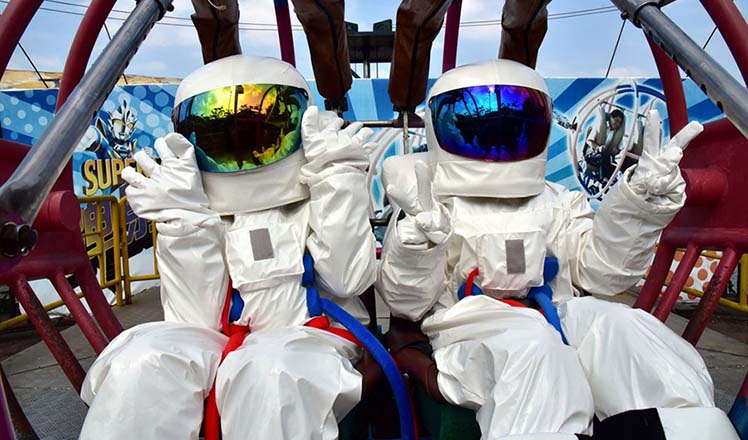
 Want to experience weightlessness? Try this ride
Want to experience weightlessness? Try this ride
 15,000 paintings, 5,000 candidates, one test
15,000 paintings, 5,000 candidates, one test
 Creating waves with stunts
Creating waves with stunts
 8 things you may not know about Start of Winter
8 things you may not know about Start of Winter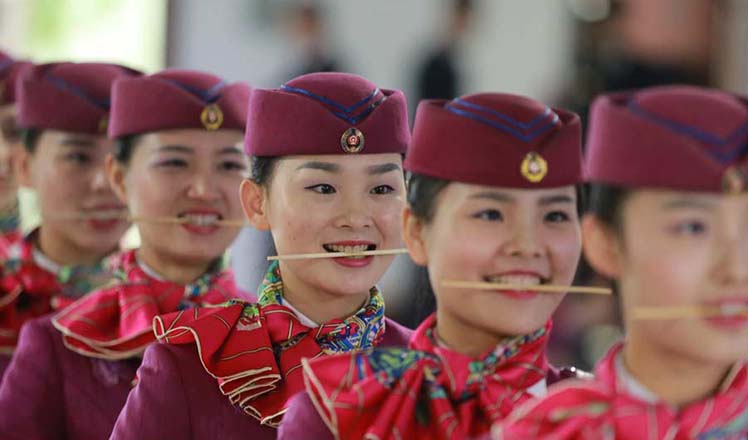
 Ten photos from around China: Oct 28- Nov 3
Ten photos from around China: Oct 28- Nov 3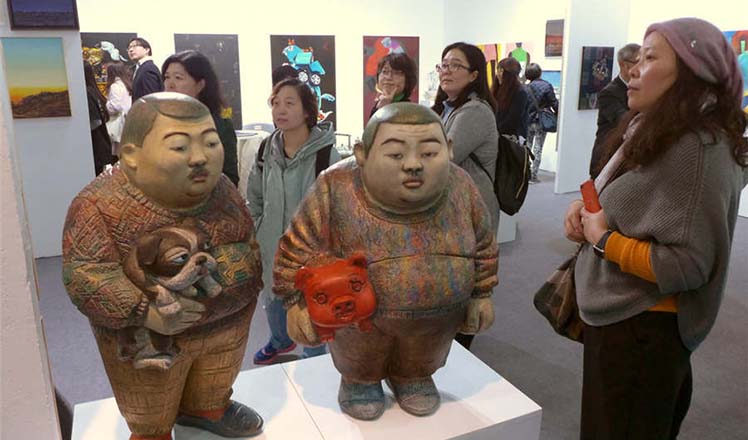
 Shanghai Art Fair connects people with art in daily life
Shanghai Art Fair connects people with art in daily life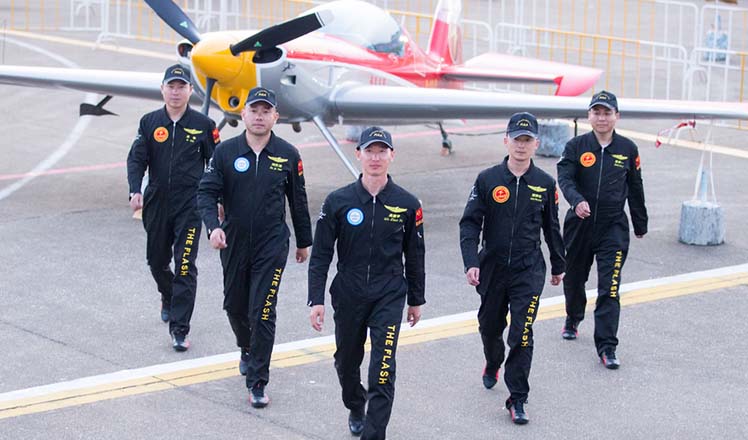
 Chinese captain takes off at Air Show China in Zhuhai
Chinese captain takes off at Air Show China in Zhuhai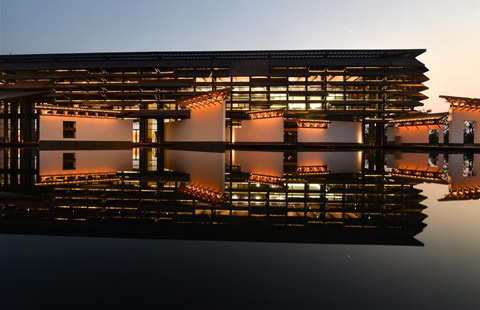
 Wuzhen Internet Intl Conference Center under preparation for 3rd WIC
Wuzhen Internet Intl Conference Center under preparation for 3rd WIC
Most Viewed
Editor's Picks

|

|

|

|

|

|
Today's Top News
US election rhetoric unlikely to foreshadow future US-China relations
'Zero Hunger Run' held in Rome
Trump outlines anti-terror plan, proposing extreme vetting for immigrants
Phelps puts spotlight on cupping
US launches airstrikes against IS targets in Libya's Sirte
Ministry slams US-Korean THAAD deployment
Two police officers shot at protest in Dallas
Abe's blame game reveals his policies failing to get results
US Weekly

|

|
